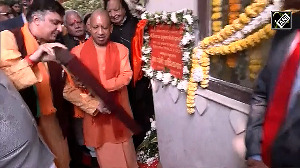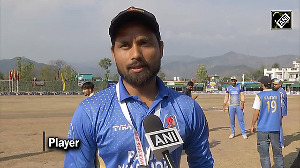Despite brave pretences, the Bharatiya Janata Party remains shell-shocked by its comprehensive, humiliating defeat in the parliamentary election. From a party that laid down the political agenda for more than a decade -- that is, even before it came to power in New Delhi in 1998 -- the BJP suddenly finds itself on the margins of politics.
Along with its NDA allies, it has been reduced to a shadow of its former self in major states like Uttar Pradesh, Bihar, Maharashtra, Tamil Nadu, and Andhra Pradesh, where it loomed large whether or not it was in power. In the Rajya Sabha, the NDA was slated to win a bare majority this summer on the assumption that it would hold firm in the states. That prospect has now receded. The BJP's allies have suffered more ignominiously, having been reduced to a third of their strength before April.
How does the BJP explain and come to terms with its rout? The short answer is, it doesn't. Its topmost leaders were stunned into graceless and undignified silence for a whole fortnight after the election results. L K Advani's 'explanation' was ludicrous: the BJP-NDA lost the mandate, but no other party/alliance won it.
But no amount of jugglery with words, or spurious reasoning about regional variations, can negate the overarching truth that the NDA was trounced in 23 out of the 28 states of India. Its rival, the United Progressive Alliance, enjoys the support of 320-plus Lok Sabha MPs -- a number the NDA couldn't dream of at the peak of its power.
Advani's 'explanation' is a non-starter, but he at least concedes that 'India Shining' was overdone: the NDA's policies fell short of the voter's expectations. A B Vajpayee, the BJP's tallest leader, isn't even prepared to concede that. He claims the BJP lost because 'we were too complacent' and in places, 'we didn't have a clear rival.' Vajpayee implicitly concedes that the BJP does well only when it campaigns negatively, by maligning its opponents, not because of its own positive appeal.
In truth, the BJP viciously attacked Sonia Gandhi in a very personal way on the 'foreign origin' issue. It missed no opportunity to hit other well-defined targets either. As for the 'Modi factor', sober analysis shows the NDA lost millions of Muslim votes everywhere, its share in that total declining from 14 percent to 11 percent -- or roughly half its share in the aggregate national vote. (By contrast, the Samajwadi Party bagged 15 percent of Muslim votes, three times higher than its overall national share. The Congress and allies secured 52 percent of the Muslim vote.) As for 'complacency', it's a question-begging term in the first place. Nobody can accuse the BJP of not having campaigned energetically, marshalling all its forces and huge sums of money, and ably 'micro-managing' things.
The BJP leadership lacks the intellectual ability to grasp the quality and causes of the electoral defeat. But does it have the resources to devise a grand game plan to stage a comeback? That too looks doubtful. Of course, the party is focusing on 'tainted' ministers. But that doesn't look too convincing given that Advani, Murli Manohar Joshi and Uma Bharti had serious charges against them all these past six years, and that George Fernandes was reinducted into the Cabinet without being cleared by the Tehelka inquiry. The NDA apparently fielded 78 candidates with a criminal record in the latest election. In any case, staging walkouts on such issues doesn't add up to a game plan.
Under its unquestioned organisational boss (Advani), the BJP will remain preoccupied with survival issues for months: how to set its house in order and keep the NDA going. The first task won't be easy, especially in the North (the entire Hindi belt excluding Madhya Pradesh, Chhattisgarh and Rajasthan), where the BJP's Lok Sabha tally has been reduced to just 25 seats out of a total of 180. In the crucial states of UP and Bihar-Jharkhand, it is down to a pathetic 15 seats.
The BJP, unlike the RSS, isn't quite a cadre organisation. Non-cadre parties which get used to power find it difficult to keep their flock together when unseated. (Look at the Congress' state for the past 20 years.) The problem is particularly grim in UP, where the BJP has fallen from 25 seats to just 10. It has no revival strategy. Its big guns -- Kalyan Singh, Rajnath Singh, Vinay Katiyar, Lalji Tandon and Kalraj Mishra -- have all failed. In most northern states, it doesn't know which group to woo, barring the urban trader.
Even in the west-central states -- MP, Chhattisgarh and Rajasthan -- BJP voters may desert it as they sober up after the hangover from the last assembly elections wears out. The Maharashtra assembly elections are around the corner. The adrenaline of central power has energised the Congress-NCP. Sonia Gandhi's campaign will further boost the alliance. It would be a surprise if the Shiv Sena-BJP mounts a major challenge to it. In any case, the BJP must piggyback the Sena. It has failed to build a durable base anywhere in Maharashtra, except among numerically tiny late-urbanising upper-caste groups.
Similarly, in Karnataka, it is not clear if the BJP can retain the Lingayat support it recently received: its base has unsteadily fluctuated between the coastal North and South, and some old Mysore districts.
Within the NDA, the number of BJP allies is now down to eight, from 24 two years ago. Of these, only the Shiv Sena is an ideological ally. And at the national level, the only active ally is the JD-U, which has shrunk to a miserable eight seats (down from 30). The numerically largest ally, the BJP, doesn't have a national profile or agenda.
The NDA's main cementing force has been Vajpayee. Today, he isn't only taking a back seat; it's unclear (but unlikely) that he will lead the NDA into the next election. There is a distinct possibility that the AIADMK and TDP will quit the NDA. The TDP now finds the BJP's communalism a huge liability. And the BJP burnt its fingers by allying with Jayalalithaa.
As if these travails weren't enough, the RSS-VHP are beginning to flex their muscles. They accuse the BJP of pussyfooting on Hindutva -- for them, the primary cause of its election debacle. They want a tough line on the 'trident' issues (Ayodhya, Article 370, and Uniform Civil Code). The BJP is divided on this. With the UPA government in power, the Ayodhya litigation is likely to be opened up, putting the BJP on the defensive and making it difficult for it to oppose a negotiated settlement. The temple issue agitation might be left to the VHP. On Article 370, the BJP cannot both oppose it and support the peace process within Kashmir and with Pakistan -- a Vajpayee 'achievement', which it capitalises on. On the UCC, it would be hard put today to drum up support. The national mood is different.
The litmus test for the BJP's strategic line-of-march and its relations with the RSS will come with the 'Modi factor': Will the BJP sack Narendra Modi in keeping with half of its Gujarat MLAs' demand? Or will it keep him despite the disgrace, infamy, and adverse litigation he has brought upon the BJP? If it does the first, that will at least signal that it might, however reluctantly, move towards 'moderation'; at least that possibility isn't closed despite Advani's recent statement that the BJP's devotion to Hindutva is nothing 'to be apologetic about.' If it chooses the second option, the BJP will further harden its ideological stance and become more brazenly communal, like the Jana Sangh.
The first choice spells a certain political direction. The BJP will have to stop looking for cheap gimmicks and too-clever-by-half slogans. It will have to work hard to rebuild and expand its political base and provide a responsible, policy-based opposition to the UPA. The second option too entails a definite trajectory, one of contraction and marginalisation.
As Advani has himself repeatedly said since 1980, a strongly ideological party cannot hope to come to power in a large, diverse, and plural country like India (the last three adjectives aren't his). It can at best hope to operate as a pressure group, representing sectoral upper-caste interests. That's exactly what the Jana Sangh was. It used to command 20 to 30 Lok Sabha seats. The BJP might go that way. There are organisational signs too: all its five newly appointed general secretaries are upper-caste people.
Of course, there is a third option: the BJP could just drift rudderlessly, stirring up anti-democratic sentiments on issues like POTA and saffronised textbooks, but providing no effective opposition. Drift also means decline. We will soon know which option the BJP chooses. But none of them will be pleasant -- unless the UPA makes a mess of things.





